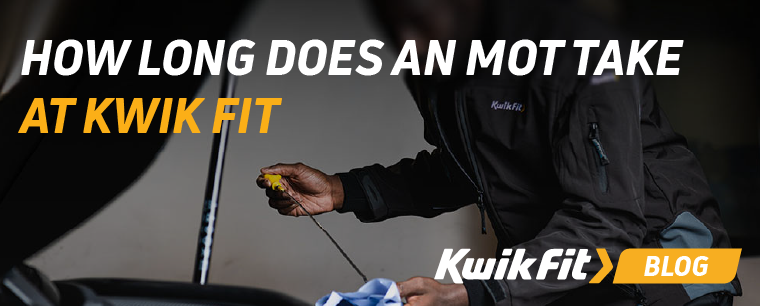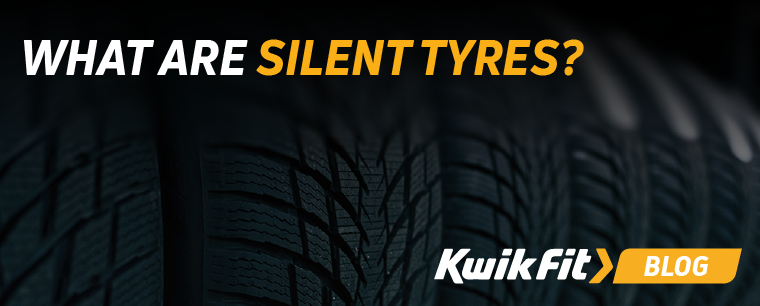UK Pothole Damage Costs Rise To £1.7bn
Jessica Bird | Wednesday 4th June 2025 1:48pm
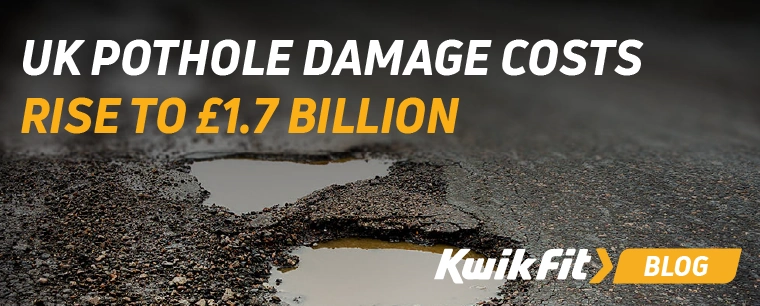
Noticing the roads are feeling bumpier than usual? Youíd be correct.
Across the UK, pothole-related damage is becoming an increasingly costly issue for motorists, with new data revealing that repair bills have soared to a staggering £1.7 billion!
From misaligned wheels to serious suspension damage, potholes can wreak havoc on your carís components, leading to unexpected expenses and safety concerns. But why are pothole problems getting worse, and what can drivers do to protect their cars?
In this blog, we take a closer look at the figures to explain how much more drivers are having to fork out as a result of rising pot hole damage, as well as the steps you can take to minimise the impact on your vehicle.
Monitoring pothole damage
The level of pothole damage across Great Britain is monitored annually by Kwik Fit, the UKís leading automotive service and repair company, for our Pothole Impact Tracker Report (PIT Report). Our latest research has found that the average repair bill faced by drivers is the highest since the company began tracking the cost in 2013.
Note: Our data includes all cars suffering pothole damage; not just those which have to be recovered from the roadside, but also those which can be driven to a garage.
The downward trend reversed...
Over the last two years, the costs of pothole damage for motorists fell significantly. However, our new data reveals a worrying trend for drivers, as the cost of pothole damage is once more on the increase.
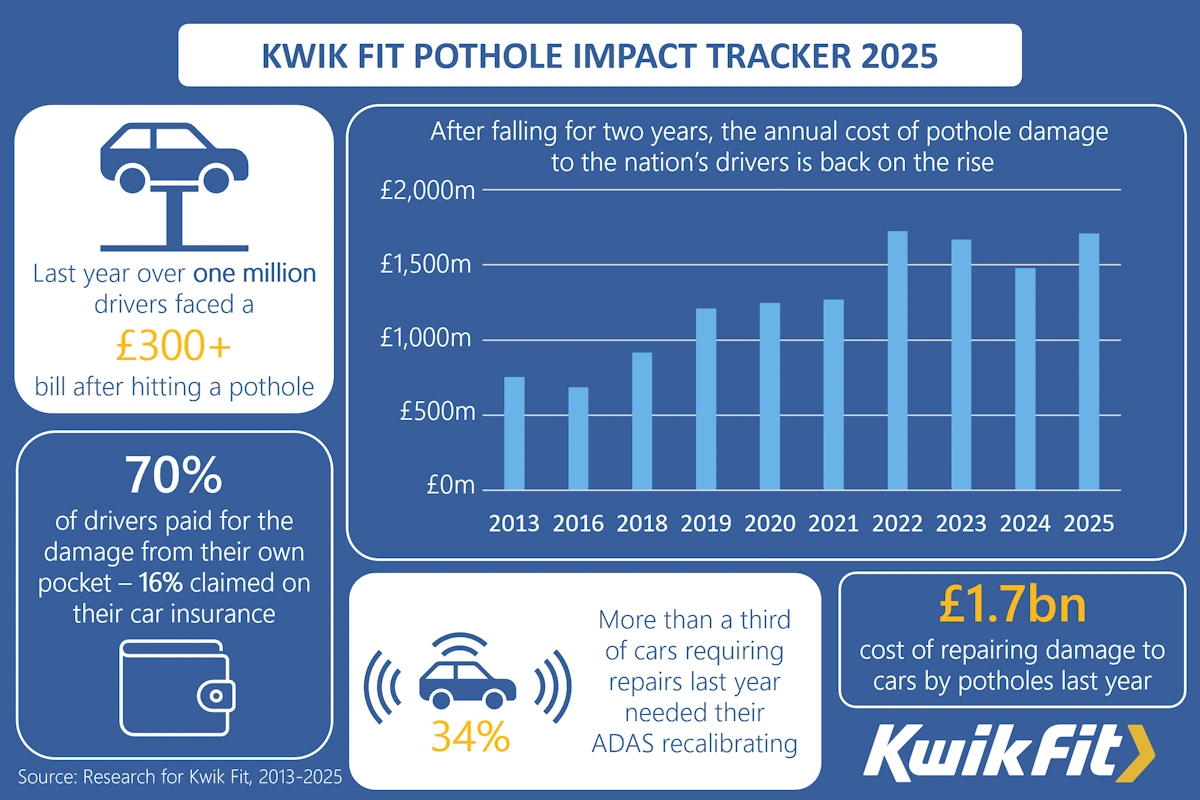
Potholes cost drivers £144 each year on average
Drivers having to repair damage from potholes over the last twelve months had to fork out an average of £144 Ė up from £120 in the previous year ó averaging £12 a month, the same as some phone bills!
Alongside the average repair cost going up, there was also an increase in the number of drivers facing the highest bills. During the last year, over one million drivers have stumped up more than £300 on repairs to their vehicle as a result of pothole encounters.
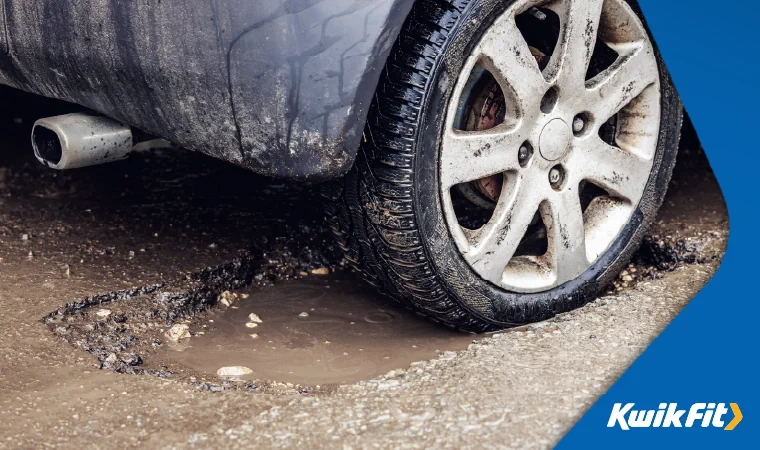
Which car components are affected the most?
If you were curious to know which parts of your car are most susceptible to pothole damage, weíve done the research to remove the guesswork. The most commonly damaged components over the last year were:
- Tyres, in 38% of repairs
- Suspension, in 28% of repairs
- And wheels, in 22% of repairs.
But the damage done to cars at the hands of potholes isnít just limited to those components; there are also implications for more technical and expensive parts too (depending on the severity of the pothole damage).
ADAS & potholes
With advanced driver assistance systems (ADAS) becoming commonplace on vehicles, potholes are having a knock-on effect beyond the immediate components damaged by the impact. For example, almost half (48%) of cars needing repairs also needed wheel alignment.
A third (34%) of cars needing repairs also required the ADAS system to be recalibrated, adding further cost to motorists. Find out more about these assistance systems in our blog, covering everything you need to know about ADAS systems.
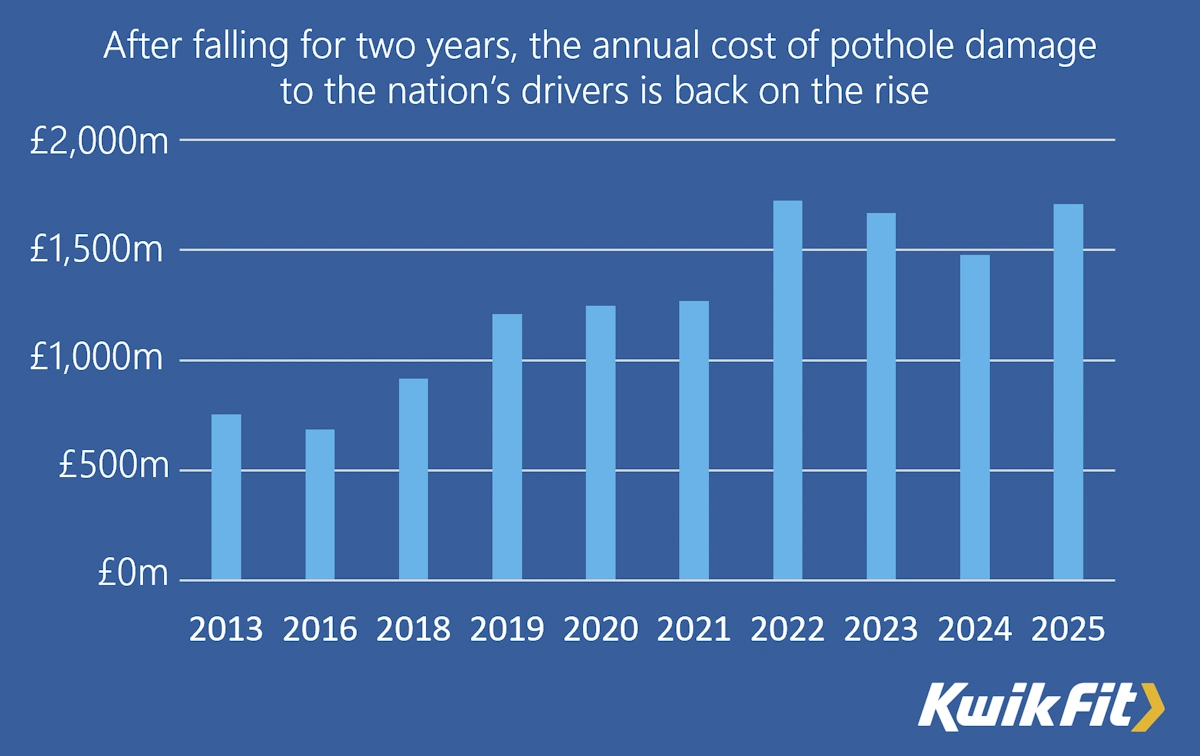
How are drivers covering the cost of pothole repairs?
With the cost of living on the rise too ó not to mention fuel prices ó how are drivers covering the increasing costs of pothole repairs?
The vast majority of the nationís repair bill has come directly from driversí pockets, with 70% funding repairs themselves.
Our research found that one in six (16%) drivers dealing with pothole repairs have claimed on their car insurance, while 7% said they were covered by separate tyre insurance policies, such as Kwik Fitís TyreCare.
Lastly, our research found that just 6% of drivers with car damage from potholes had claimed compensation from the local authority responsible for the road.
Need help taking care of your tyres?
Kwik Fitís TyreCare is a tyre insurance policy that protects your tyres from damage (accidental or malicious). Starting from as little as £6.99 per tyre, our policy repairs, replaces, fits, and balances your tyres in the event of damage ó at no additional cost to you.
If you hit a pothole, we can repair the damage to your tyres (including valves) and help you get back on the road in no time. Find out more on our TyreCare page.
Is the UK's pothole situation getting worse?
The data certainly indicates that the amount and severity of potholes on the UKís roads is worsening, especially since the two-year downward trend has been reversed over the last 12 months. But, what do motorists think?
What do motorists think?
Over half (51%) of drivers believe that the roads in their area are in a worse condition than they were 12 months ago, with only 16% thinking they are better. The majority of drivers are also pessimistic about the future when it comes to road surface improvement. 62% of drivers asked say they donít expect the roads in their local area to improve in the near future, despite the additional funding recently announced by the government.
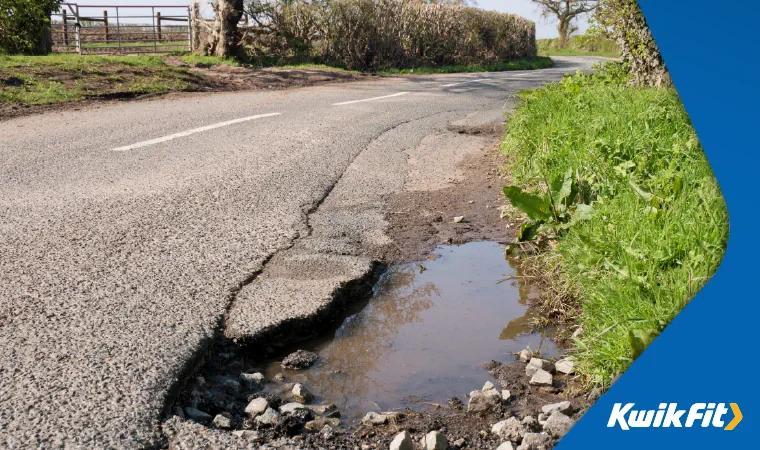
The experts weigh in on potholes
While the roads seem to have taken a turn for the worse recently, and resurfacing isnít within our direct control, motorists can control how they drive, avoiding potholes, taking good care of their car, and seeking low cost repairs in the event of damage.
Hereís what our experts had to say on the matter. Dan Joyce, Operations Director at Kwik Fit, said:
ďItís concerning to see that the downward trend of the last two years has gone into reverse in the latest figures. Anything which adds unnecessary costs to motorists is especially unwelcome in the current economic climate but even the financial burden is outweighed by the risk to safety.
The main components which bear the bulk of the damage Ė tyres and wheels, suspension and steering - are interlinked. Even if a car is driveable after hitting a pothole, the impact may have compromised its handling, as can be seen by the fact that many drivers have had to have vital ADAS technology recalibrated. Not only do potholes present an immediate risk at the time of impact, they can have a longer term effect on its safety on the road.Ē
How to avoid costly pothole damage?
Our experts share their tips to help drivers minimise the risk of pothole damage:
- Maintain pressure: Tyres are the contact point Ė the correct inflation will help absorb some of the impact.
- Give time and space: Easing off the speed and leaving more space in front gives drivers more time to spot and avoid potholes, and if they canít be avoided, will reduce the force of the impact
- Check Ė and check again: If impact is unavoidable, drivers should pay close attention to the car afterwards. If it feels or sounds different, drivers should find a safe place to stop and check for damage. And then, check again in the following days, as some damage may not be immediately apparent.
Learn more strategic pothole safety tips in another of our blogs, outlining 4 pothole safety tips every driver should know.
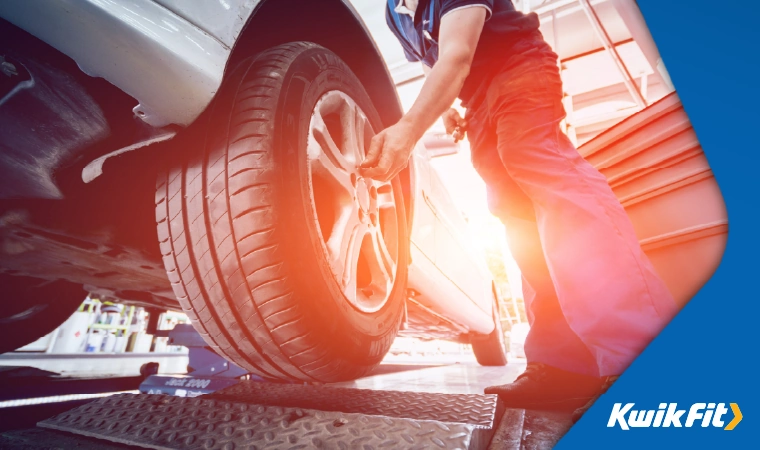
Pothole problems? Count on Kwik Fit
If youíve hit a pothole and suspect you may have suffered damage, bring your car to your nearest Kwik Fit centre for a Free Tyre Check by our expert technicians, as well as further consultation and necessary repairs.
In the meantime, keep up with the latest news and stats from the motoring world with the Kwik Fit Blog and Guides; from wheel balancing explained to tyre damage tips, weíve got you covered.
Any facts, figures and prices shown in our blog articles are correct at time of publication.
Featured Articles
How Much Fuel Does Air Conditioning Use?
Thursday 29th May 2025
Your carís air con uses a surprising amount of fuel to keep you cool, especially if itís low on refrigerant & working overtime. Find out the exact figures here.
How Long Does An MOT Take At Kwik Fit?
Friday 23rd May 2025
The yearly MOT test is dreaded by many drivers, but how long does the actual MOT test take, and what goes into it? Hereís what affects the length of your test.
What Are Silent Tyres?
Saturday 3rd May 2025
Looking for a more luxurious, peaceful drive? Silent tyres could be the answer with their clever technology. Discover how these tyres work in our latest blog.



